
Charles John Huffam Dickens was an English novelist and social critic who created some of the world's best-known fictional characters, and is regarded by many as the greatest novelist of the Victorian era. His works enjoyed unprecedented popularity during his lifetime and, by the 20th century, critics and scholars had recognised him as a literary genius. His novels and short stories are widely read today.

Jack Dawkins, better known as the Artful Dodger, is a character in Charles Dickens's 1838 novel Oliver Twist. The Dodger is a pickpocket and his nickname refers to his skill and cunning in that occupation. In the novel, he is the leader of the gang of child criminals on the streets of London trained and overseen by the elderly Fagin. The term has become an idiom describing a person who engages in skillful deception.

Sam Weller is a fictional character in The Pickwick Papers (1836), the first novel by Charles Dickens, and the character that made Dickens famous. A humorous Cockney bootblack, Sam Weller first appeared in the fourth serialised episode. Previously the monthly parts of the book had been doing badly, selling only about 1,000 copies a month — but the humour of the character transformed the book into a publishing phenomenon, raising the sales by late autumn of 1837 to 40,000 a month.

The Posthumous Papers of the Pickwick Club was the first novel by English author Charles Dickens. Because of his success with Sketches by Boz published in 1836, Dickens was asked by the publisher Chapman & Hall to supply descriptions to explain a series of comic "cockney sporting plates" by illustrator Robert Seymour, and to connect them into a novel. The book became a publishing phenomenon, with bootleg copies, theatrical performances, Sam Weller joke books, and other merchandise. On its cultural impact, Nicholas Dames in The Atlantic writes, "'Literature' is not a big enough category for Pickwick. It defined its own, a new one that we have learned to call "entertainment." Published in 19 issues over 20 months, the success of The Pickwick Papers popularised serialised fiction and cliffhanger endings.

Augustus Snodgrass is a fictional character in Charles Dickens's first novel, The Pickwick Papers (1836). He considers himself a Romantic poet, though there is no mention of any of his own poetry in the novel.
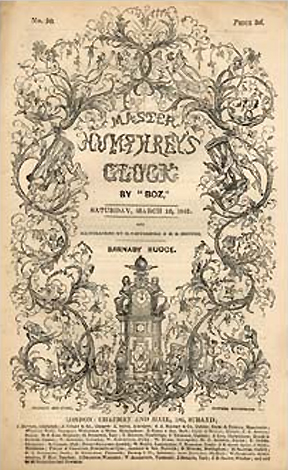
Master Humphrey's Clock was a weekly periodical edited and written entirely by Charles Dickens and published from 4 April 1840 to 4 December 1841. It began with a frame story in which Master Humphrey tells about himself and his small circle of friends, and their penchant for telling stories. Several short stories were included, followed by the novels The Old Curiosity Shop and Barnaby Rudge. It is generally thought that Dickens originally intended The Old Curiosity Shop as a short story like the others that had appeared in Master Humphrey's Clock, but after a few chapters decided to extend it into a novel. Master Humphrey appears as the first-person narrator in the first three chapters of The Old Curiosity Shop but then disappears, stating, "And now that I have carried this history so far in my own character and introduced these personages to the reader, I shall for the convenience of the narrative detach myself from its further course, and leave those who have prominent and necessary parts in it to speak and act for themselves."

Wellerisms, named after sayings of Sam Weller in Charles Dickens's novel The Pickwick Papers, make fun of established clichés and proverbs by showing that they are wrong in certain situations, often when taken literally. In this sense, Wellerisms that include proverbs are a type of anti-proverb. Typically a Wellerism consists of three parts: a proverb or saying, a speaker, and an often humorously literal explanation.

Samuel Pickwick is a fictional character and the main protagonist in The Pickwick Papers (1836), the first novel by author Charles Dickens. One of the author's most famous and loved creations, Pickwick is a retired successful businessman and is the founder and chairman of the Pickwick Club, a club formed to explore places remote from London and investigate the quaint and curious phenomena of life found there.
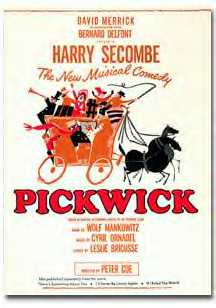
Pickwick is a musical with a book by Wolf Mankowitz, music by Cyril Ornadel, and lyrics by Leslie Bricusse. Based on the 1837 novel The Pickwick Papers by Charles Dickens, it is set in and around London and Rochester in 1828.

Charley Bates is a supporting character in the Charles Dickens's 1838 novel Oliver Twist. He is a young boy and member of Fagin's gang of pickpockets, and sidekick to the Artful Dodger, whose skills he admires unreservedly. Bill Sikes's murder of Nancy shocks him so much that at the end of the novel he leaves London to become an agricultural labourer.

Nathaniel Winkle is a fictional character in Charles Dickens's first novel, The Pickwick Papers (1836).

The Pickwick Papers is a 1952 British historical comedy drama film written and directed by Noel Langley and starring James Hayter, James Donald, Nigel Patrick and Joyce Grenfell. It is based on the Charles Dickens’s 1837 novel of the same name. It was made by Renown Pictures who had successfully released another Dickens adaptation Scrooge the previous year.
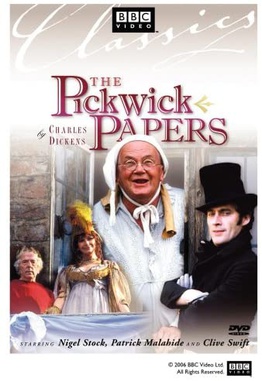
The Pickwick Papers is a twelve-part BBC adaptation of the 1837 novel The Pickwick Papers by Charles Dickens, first broadcast in 1985. It starred Nigel Stock, Alan Parnaby, Clive Swift and Patrick Malahide, with narration by Ray Brooks.

Joseph Clayton Clark, who worked under the pseudonym "Kyd", was a British artist best known for his illustrations of characters from the novels of Charles Dickens. The artwork was published in magazines or sold as watercolor paintings, rather than included in an edition of the novels.

Dickensian is a British drama television series that premiered on BBC One from 26 December 2015 to 21 February 2016. The 20-part series, created and co-written by Tony Jordan, brings characters from many Charles Dickens novels together in one Victorian London neighbourhood, as Inspector Bucket investigates the murder of Ebenezer Scrooge's partner Jacob Marley.

The Pickwick Papers is a 1913 three-reel silent film based on the 1837 novel of the same name by Charles Dickens. The film was produced by Vitagraph Studios and features John Bunny in the title role of Samuel Pickwick.
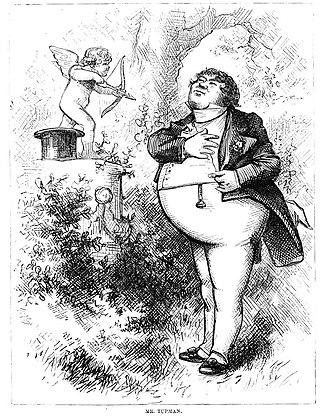
Tracy Tupman is a fictional character in Charles Dickens's first novel, The Pickwick Papers (1836). Although fat and middle-aged he considers himself a young lover and has an unfortunate amorous entanglement with the spinster Rachael Wardle.
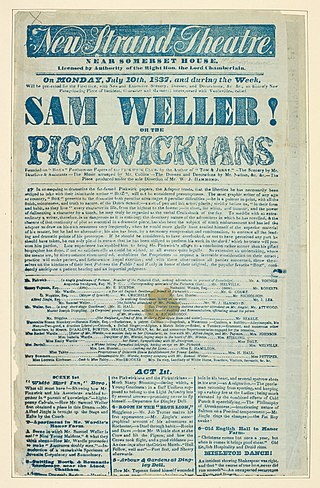
Samuel Weller, or, The Pickwickians is an 1837 comedy in three acts adapted from Dickens's novel The Pickwick Papers by William Thomas Moncrieff. It was first performed at the Royal Strand Theatre in London on 17 July 1837.
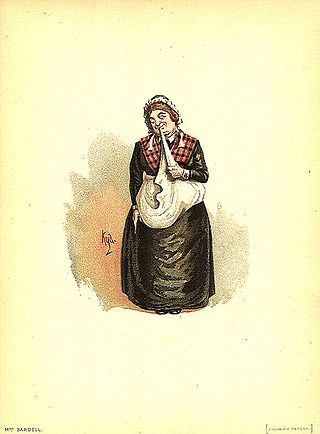
Mrs Martha Bardell is a fictional character in The Pickwick Papers (1836), the first novel by Charles Dickens. A widow and the landlady of Mr Pickwick, a romantic misunderstanding between the two results in one of the most famous fictional legal cases in English literature, Bardell v. Pickwick, leading to them both being incarcerated in the Fleet Prison for debt.























